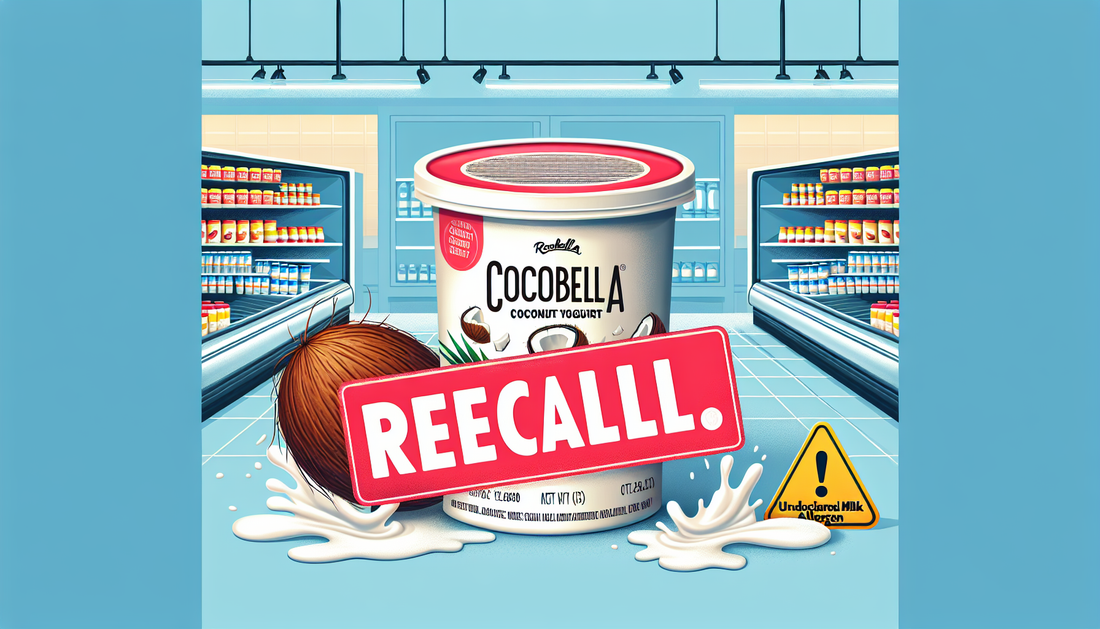
Cocobella Coconut Yogurt Recall Highlights Importance of Allergen Labeling
SizzleBot 3.0 RecipesShare
Convert Cocobella, a popular brand of coconut yogurt, has issued a recall that underscores the critical need for precise allergen labeling in food products. The recall was sparked by a contamination issue where products intended to be dairy-free were mispackaged and inadvertently contained allergens, posing a risk to consumers with milk allergies.
- Recall initiated on October 15, 2023, for specific batches of Cocobella Coconut Yogurt.
- Affected products include 500g tubs labeled as dairy-free discovered to contain milk.
- Distribution included major retailers across the United States, specifically targeting California and New York.
- No reported injuries have been documented; however, customers are urged to return products to retailers for a full refund.
- The FDA has been alerted and is monitoring the situation for consumer safety.
This incident highlights the ongoing challenges in food safety and the vital importance of accurate labeling to protect vulnerable consumers. 🥥⚠️
The recent recall of Cocobella coconut yogurt in Singapore has raised significant concerns regarding food safety standards. Customers were alerted after it was found that certain batches contained undeclared milk allergens. This issue primarily impacts individuals with milk allergies, highlighting the importance of proper labeling in food products. The recall process underscored the seriousness with which food safety is treated in Singapore, a nation known for its stringent regulations.
Details of the Contaminated Product
Cocobella, a popular brand under the Malaysian company NDS International Sdn Bhd, issued the recall of its coconut yogurt products that were identified as having undeclared milk allergens. The affected products include the 450g and 1kg sizes of the yogurt, with the product codes 00118, 00119, and 00121 being particularly pointed out. Consumers who had purchased these products between July 2025 and August 2025 were advised to return them for a refund.
Timeline of Events Surrounding the Recall
The issue came to light on August 24, 2025, when The Star (Malaysia) reported the recall initiated by the Singapore Food Agency (SFA). The SFA had conducted regular checks and discovered that the coconut yogurt contained trace amounts of milk. As a result of these findings, a public notice was issued to inform consumers of the potential health risks related to the product. On the same day, NDS International promptly activated a recall of the affected products, urging customers to seek refunds.
SFA advised the public to remain vigilant and to only purchase products with clear allergen labeling. This recall illustrated the serious implications of food labeling regulations and the risks posed to consumers with food allergies.
The Impact on Consumers
The recall has significant implications for consumers, especially those with milk allergies. In Singapore, the awareness of food allergens has grown substantially over the past few years, prompting consumers to seek products labelled clearly. These incidents reinforce the critical nature of responding promptly to food safety issues for public health. NDS International has expressed regret over the oversight and committed to enhancing production and labeling processes.
Health Risks Associated with Undeclared Allergens
Undeclared allergens in food products can lead to serious health complications for sensitive individuals. Consumers allergic to milk may experience reactions ranging from mild irritations to severe anaphylactic shocks. It’s crucial for manufacturers to take food labeling seriously to avoid putting consumers’ health at risk. The incident has prompted discussions about the adequacy of current regulations in the food manufacturing and distribution sectors.
Response from Authorities and Manufacturers
Following the recall, the Singapore Food Agency reiterated its commitment to ensuring food safety standards. The agency is known for its proactive approach towards monitoring food products and handling emergencies. They provided guidelines for consumers to identify safe products and highlighted the importance of checking food labels before consumption.
NDS International is working with regulatory bodies to improve their compliance processes. The company stated that they are reviewing their production lines and supplier networks to prevent similar occurrences. This proactive approach could help regain consumer trust and reassure the public of the company’s commitment to safety.
Future Safety Measures
As a reaction to this incident, manufacturers in Singapore will likely face increased scrutiny concerning food safety practices. The incident demonstrates a need for greater transparency in labeling. This may lead to more rigorous checks by authorities to ensure compliance with safety regulations. Consumer awareness initiatives are also expected to grow, educating the public about allergic reactions and how to identify potential risks in food products.
Consumer Awareness and Responsibility
A key takeaway from the Cocobella coconut yogurt recall is the need for consumer awareness regarding food allergies. Consumers are encouraged to familiarize themselves with allergen information, and if in doubt, consult with retailers or manufacturers directly. The incident serves as a reminder that vigilance is essential when it comes to food safety.
This recall not only impacts the affected individuals but also reverberates across the food industry as businesses review their safety protocols. The necessity for transparent labeling has become more evident, encouraging customers to actively engage in food safety practices.
Looking Ahead: Lessons Learned
The Cocobella yogurt recall serves as a powerful lesson for manufacturers and consumers alike. It emphasizes the importance of adhering to strict food labeling regulations and maintaining transparency throughout the food production process. Consumers are encouraged to remain informed about food safety, while producers must prioritize the effectiveness of their labeling processes to protect vulnerable populations.
Moving forward, it will be vital for both consumers and manufacturers to cultivate a culture of safety and accountability in food production and consumption. Regular audits and improved safety protocols are essential to build consumer confidence in food products.











